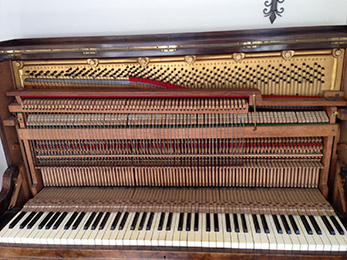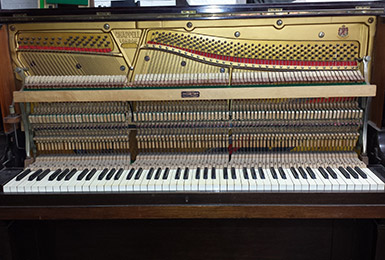Check our list below to see if your question has already been answered.
If not, call us on 0274 731 224 and we'd be happy to help.
Piano Tuning
We recommend, as piano manufacturers do, that pianos be tuned twice a year, although some of our customers find once a year sufficient. If a piano is being used frequently, more regular tunings will allow us to refine the tuning. Pianos should always be tuned prior to concerts and important performances.
Pianos which have not been tuned for a number of years often drop in pitch. If this is the case with your piano, it will require pitch-raising to re-establish the correct pitch (a1440) before it can be tuned. There is an additional charge for this. If a piano has been unused, it will commonly need additional work to make it serviceable again.
How do I book a tuning?
Please phone David on 0274731224
Or email us at info@jenkinpiano.co.nz
What does tuning cost?
Tuning in metropolitan Auckland costs $190 inc GST. There are additional travel charges for pitch raising, typically $ 60 (often necessary if pianos have not been tuned regularly) and tuning in out-lying suburbs.
What is the best position for my piano?
A stable environment is best for your piano. Frequent moves and extremes of humidity and/or temperature will make tunings unstable and can permanently damage some components of your piano. Excessive humidity can swell timber and felt, causing sluggish mechanisms and keys which stick. Excessive dryness will split timber, break glue joints and cause loose, noisy mechanisms.
Avoid: damp, draughts, direct sunlight, windows and doors, close proximity to fires, heaters, central heating vents, underfloor heating and radiators. A Dampp-Chaser®, Piano Life Saver System can help create a stable environment for your piano. Having your piano in a poor position or environment will cause problems, tuning instability and, may void a warranty.
I'm moving house, how do I shift my piano?
Do not attempt to move the piano yourself. The risk of injuring yourself and damaging the piano is simply too great. We strongly recommend:
- In Auckland, Specialist Piano Movers https://specialistpianomovers.co.nz/ Call Richard on 021 228 2279
- In Wellington and for piano movements long haul, Amoova 050 8008 050 www.amoova.com
Is my piano covered by house and contents insurance?
Many household insurance policies require musical instruments over a specified value to be notified. It's worth checking that your piano is covered.
I have been told to avoid ove-rdamper pianos as they are an antiquated, poor design, and frequently un-serviceable. How do I recognize them?
Here are two photos. The first is an overdamper (to be avoided) and second, a conventional underdamper.


Pianos do not improve with age. While the very best quality instruments have a long useful life, we are frequently called to tune, repair or service old, poor quality, unserviceable or decrepit pianos. Here is a list of pianos that fall into one or more of these categories. Often these pianos change hands for just a few dollars on trademe, the owners have discovered that it will cost to have them removed. Please do not donate these pianos to a school, church or kindergarten. You are simply passing on a problem.
| Pianos to avoid: | |
| Allison | commonly over-dampers |
| Arthur Allison | commonly over-dampers |
| Atwater Kent | poor quality |
| Bell | poor tone |
| Bently | poor tone, poor quality |
| Bishop | poor tuning planks |
| Bishop Stirling | poor tuning planks |
| Blessing | poor quality, not a blessing! |
| Böhm | mostly very old overdamper |
| Brinsmead | Older instruments may be overdamper |
| Bruns - Berlin | old, un-tuneable, usually over damper |
| Broadwood and esp Broadwood White | Older instruments my be overdampers, Recent Asian manufacture poor quality |
| Carl Ecke | very old, poor quality |
| Carmen | poor quality |
| Chas Begg | too old. |
| Danemann | avoid small ones |
| Fritz Kuhla | bad tuning planks |
| Gors & Kahlmann | dodgy tuning planks / over dampers |
| Haake Hannover | older ones commonly over-dampers |
| Hamilton | poor quality |
| Horugel | poor quality |
| Hsinghai | poor quality |
| Hupfeld | regulation problems, very poor quality |
| Humphrey | Poor quality |
| Jensen More | tuning plank problems |
| John Spencer | older ones commonly over-dampers |
| Justin Browne | very poor quality |
| Kirchner | poor quality overdamper |
| Koch & Soehne | some have tuning plank problems |
| Leswein | very old, often over dampers, practically untunable |
| Liederstrom | Unreparable plastic parts |
| Lindner | Unreparable plastic parts |
| Mercedes | probably the worst piano ever built ( see Trebel ) |
| Metzler | |
| Mozart | Who knows? |
| Nieer | poor quality |
| Pearl River | poor quality |
| Ramsperger | poor bridges and tuning planks |
| Schreiber | poor quality tone, poor sound-boards |
| Schubert | over-dampers |
| Silvester | |
| Spencer | Older instruments may be overdamper |
| Strobech | Very small marginal quality |
| Stanley Brinsmead | commonly have damper problems |
| Storey & Clark | poor quality |
| Strauss | very poor quality |
| Trebel | trouble, probably the worst piano ever built |
| Verdi | poor quality |
| Waldberg | |
| Walter Collinson | older ones are over-dampers, poor soundboards, poor damping |
| Washburn | |
| Werner | |
| Whitney | poor quality |
| Whitney | poor quality |